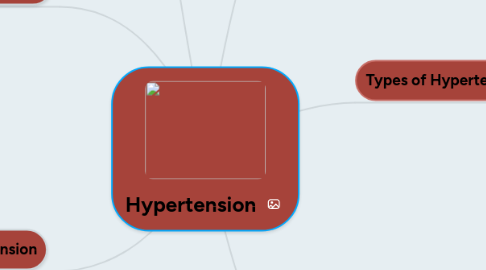
1. Ranges
1.1. Normal: 120/80
1.2. High: 140/90
1.2.1. The higher the blood pressure, the more dangerous it can be!
2. Risk Factors
2.1. Obesity
2.2. Family History
2.3. Physical Inactivity
2.4. Sodium Intake
2.5. Alcohol and Tobacco
3. Effects of Hypertension
3.1. Renal
3.1.1. Hypertension can have a significant impact on an individual's kidneys
3.1.2. Hypertension can lead to kidney failure
3.1.3. Hypertension causes the renal arterioles to become narrow - which decreases blood flow to the kidneys.
3.2. Vascular
3.2.1. Vessels become worn out due to hypertension
3.2.2. The onset of arteriosclerosis
3.3. Cardiac
3.3.1. Hypertension can cause the heart to enlarge
3.3.2. Hypertension forces the heart to pump and work faster - overusing its capacity
3.3.3. Can lead to cardiac failure
4. Types of Hypertension
4.1. Essential or Primary
4.1.1. Essential or "primary" hypertension is typically diagnosed during a doctor's visit.
4.1.2. Most cases of hypertension are characterized as essential or primary
4.1.3. Cases are considered essential when there is no known secondary cause to a patient's hypertension (elevated blood pressure).
4.2. Secondary
4.2.1. Secondary hypertension is caused by a known or determined factor - i.e. chronic kidney disease or a hyperactive thyroid gland.
4.3. Isolated Systolic
4.3.1. Hypertension that occurs when the systolic pressure becomes elevated but has a normal or lower than normal diastolic pressure.
4.3.2. Common among older or aging adults
4.3.2.1. This is due to aging of the body - the aorta and major arteries become lose their flexibility.
5. Signs and Symptoms
5.1. The signs and symptoms individuals with high blood pressure will experience will differ.
5.2. Oddly enough, some individuals may not even experience any symptoms or show signs of hypertension
5.3. If symptoms or signs are present, here is what to look out for: chronic headaches, nosebleeds, and shortness of breath.
5.4. These signs or symptoms don't necessarily mean high blood pressure. If you suspect you may have high blood pressure, visit your primary care doctor.
6. Treatment for Hypertension
6.1. Reducing the opportunity for hypertension is the best treatment source - changing your lifestyle.
6.1.1. Maintain physical activity
6.1.2. Incorporate a healthy diet
6.1.3. Limit sodium intake
6.1.4. Quit smoking
6.2. Hypertension medications are also used
6.2.1. These drugs lower the blood pressure
6.2.1.1. Thiazide diuretics
6.2.1.2. Beta blockers
6.2.1.3. ACE inhibitors

